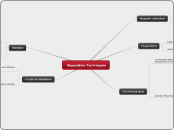Separation Techniques
Fractional Distillation
has various purposes in real life
obtain petroleum from crude oil
separate the different elements present in air
brew alcoholic beverages
used to separate a mixture of miscible liquids with different boiling points
liquids that mix are called "miscible"
liquids that do not mix are called "immiscible"
Filtration
can be carried out quickly by a electronic device called the "centrifuge"
Can be used to separate a solid from a solid
Can be used to separate a solid from a liquid
a liquid with solid particles in it is called a "suspension"
When a supsension is filtered, the solid left behind on the filter paper is called the "residue", while the liquid that passes through the filter paper is called the "filtrate"
Chromatography
consists of four types of chromatography
ion-exchange
gas
liquid
paper
etc.
find coloured coloured substances in food such as canned vegetables or sweets
used for RNA fingerprinting in forensics
used to identify poison or drugs
used to separate components of a mixture by treating the mixture with a solvent
an analytical method of separation for isolating the coloured components of a mixture
Evaporation
used to separate dissolved solids from a solution
the liquid will evaporate into the air, leaving behing the dissolved solids
a gradual change of state from a liquid to a gas
occurs at the surface of the liquid
Magnetic Attraction
separates a magnetic element from a non-magnetic element in a mixture
uses the basic concept of magnetism

